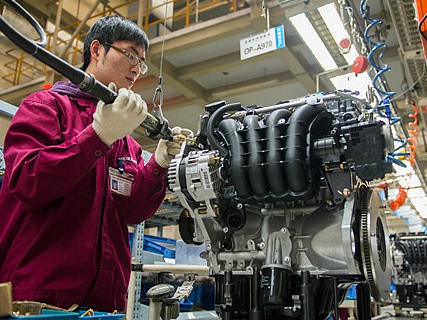|
 |
|
INNOVATION IS KEY: A staff member assembles an engine at JAC Automobile on November 27 in Hefei, capital of Anhui Province. That day, the 1 millionth engine that the company independently developed rolled off the production line (DU YU) |
Solar Duties
The European Union (EU) on November 28 imposed tariffs of up to 42.1 percent on solar glass imports from China.
Chinese manufacturers had been allegedly selling the product, which is used for producing solar panels, in the EU at prices below cost, thus causing "material injury" to EU producers, the European Commission said in its Official Journal.
The provisional levies, resulting from an anti-dumping investigation the commission launched in February, would range from 17.1 percent to 42.1 percent.
The decision came months after China and the EU solved solar panel trade disputes through "an amicable solution" in August.
The duties would be effective for six months, but would be prolonged for five years if the EU's 28 member states make a final ruling by May 27 next year to do so.
E-commerce
China's coastal areas lead the Greater China region in cross-border e-commerce retail, ranking highest in both transaction volume and growth rate, according to a report by global online retail giant eBay on November 27.
From June 2012 to June 2013, the southern coastal province of Guangdong overtook Hong Kong to rank first in the Greater China region in cross-border e-commerce retail sales volume, with east China's Shanghai Municipality ranking third, data from the eBay report showed.
During the same period, exporters in the coastal provinces of Fujian, Zhejiang and Jiangsu recorded the fastest year-on-year growth in cross-border e-commerce sales via eBay platforms, with total sales surging 76.1 percent, 56.1 percent and 52.0 percent, respectively.
E-commerce business in central China's Hubei, Hebei and Henan provinces has also been growing quickly.
For e-commerce retailers across the Greater China region, business targeting emerging markets, including Argentina, Israel and Brazil, has witnessed substantial growth.
Price Fixing
China's leading price regulator will crack down on excessively high prices in six industries as it looks to further protect consumers, Shanghai Securities News reported on November 25.
The industries include aviation, consumer goods, automobiles, telecommunications, pharmaceuticals and home appliances, said Lu Yanchun, an official with the National Development and Reform Commission (NDRC), at a training course on anti-price monopoly laws and regulations in Guangzhou, capital of south China's Guangdong Province.
Lu said China has established an anti-monopoly legal system which contains an Anti-Monopoly Law, Regulations on Anti-Price Monopoly and Procedural Regulations on Administrative Enforcement of Anti-Price Monopoly.
In January, the NDRC imposed heavy fines on overseas companies after years of investigations. It levied 353 million yuan ($57.5 million) in fines against six liquid crystal display (LCD) producers, including Samsung, LG and four Taiwanese firms, for their participation in a price fixing cartel agreement.
In August, the NDRC imposed fines totaling 670 million yuan ($109.95 million) against six baby formula companies operating on the Chinese mainland following an anti-trust probe. The companies were Biostime, Mead Johnson, Dumex, Abbott, Friesland and Fonterra.
| 